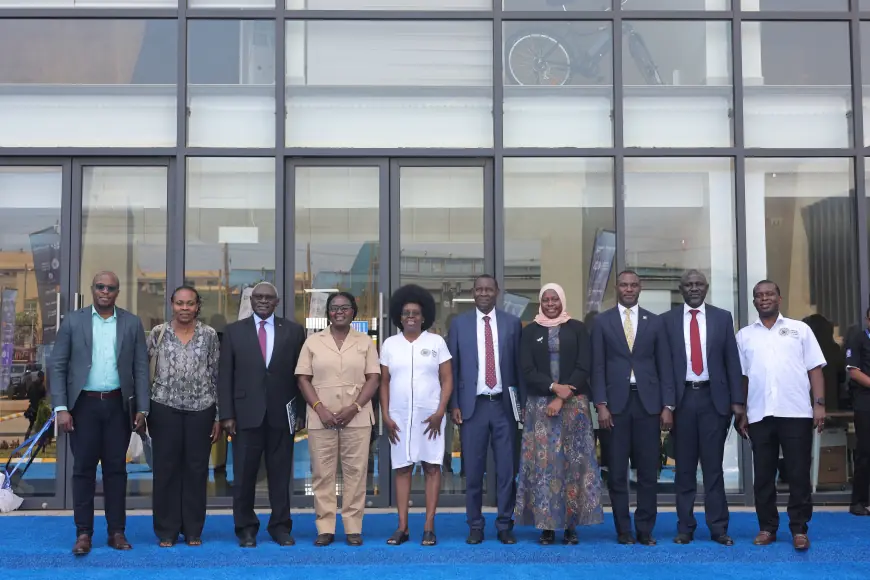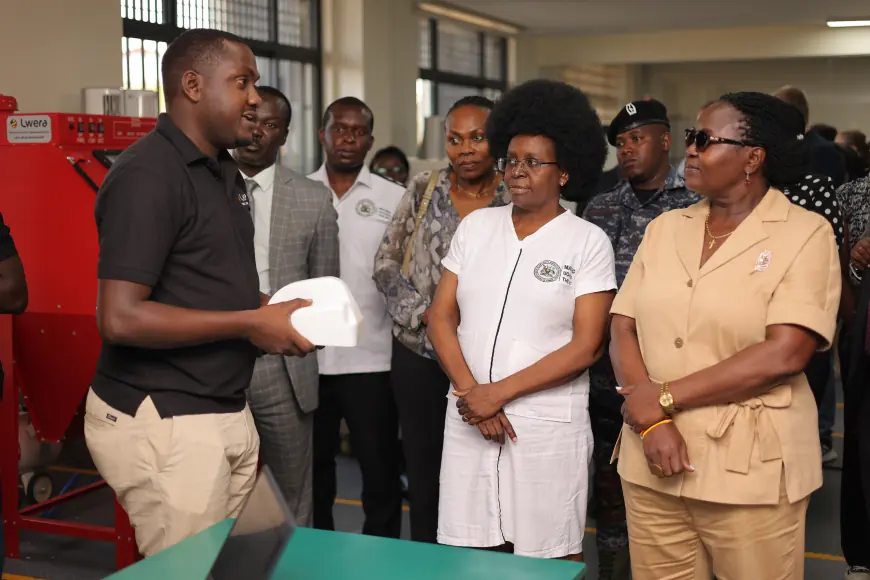A New Deep Tech Center of Excellence unveiled to foster technology innovation among Uganda's youth.

In a strategic move to accelerate Uganda’s leap into a knowledge-based economy, the Science, Technology, and Innovation (STI) Secretariat, in collaboration with Future Lab, the Research to Industry Centre of Excellence, the Uganda National Council of Science and Technology, and the National Science, Technology, Engineering, and Innovation Skills Enhancement Project (NSTEI-SEP), officially launched the Uganda Deep Tech Centre of Excellence in Namanve.
This landmark initiative in Namanve marks a transformative moment in the nation’s deep technology and industry 4.0 evolution.
The launch event, on 19th February 2025 was graced by the Honorable Ruth Nankabirwa, Minister of Energy and Mineral Development, and hosted by Dr. Monica Musenero, Minister of Science, Technology, and Innovation.
In her address, Dr. Musenero highlighted the Centre’s role in driving Uganda toward a knowledge-based economy.
“Through this Centre, we aim to create a dynamic ecosystem where deep technology propels economic transformation and provides new opportunities for young people,” she stated. “Our goal is to strategically elevate Uganda's global competitiveness by positioning Science, Technology, and Innovation as key drivers of economic growth, in alignment with Vision 2040” Dr. Musenero said.
She added, “The Deep Tech Centre of Excellence is a state-of-the-art facility designed to foster innovation in cutting-edge technologies such as Artificial Intelligence, Machine Learning, Internet of Things, Robotics, Biotechnology, Advanced Materials, Cloud Computing, Edge Computing, and Quantum Computing. The Centre’s launch also featured the unveiling of the Local Electronics Manufacturing Facility, implemented by Lwera Semiconductors, and showcased groundbreaking innovations from Ugandan deep tech pioneers like Innovex, Kaara Energy, and Tech Anatomy” Musenero emphasized.
 Innovator explaining to ministers at the event
Innovator explaining to ministers at the event
Key initiatives announced at the event include the AI for BPO initiative, an AI studio to support Ministries, Departments, and Agencies in adopting AI technologies for improved service delivery, and a Deep Tech Venture Studio to empower innovators in building world-class ventures. Additionally, the Centre will house a local data repository and exchange program, alongside initiatives focused on commercializing academic research and fostering corporate venture capital.
With the global deep tech sector rapidly expanding, the World Economic Forum predicts over 100 million jobs in the sector by 2030, according to its Future of Jobs Report 2025. This means Uganda stands to benefit immensely from the centre, with the potential for high-value job creation, increased investment in research-driven enterprises, and the development of a robust deep tech ecosystem.
David Gonahasa, Lead of the Industry 4.0+ Bureau at the STI Secretariat, emphasized the Centre’s alignment with Uganda’s broader Industry 4.0+ framework. “This initiative is part of Uganda’s strategy to catalyze innovation in emerging technological fields, giving the country a global competitive edge. By embedding deep tech innovation, Uganda can lead the Fourth Industrial Revolution,” he stated.
While highlighting the Centre's strategic importance, Arthur Mukembo, CEO of Future Lab and Co-Founder of the Centre said, “We are focused on providing unparalleled access to world-class R&D and commercialization infrastructure, nurturing the technical, research, entrepreneurial, and management talent necessary to lead this emerging space. By leveraging cutting-edge technologies like AI, Machine Learning, Big Data Analytics, and the Internet of Things, we aim to address critical challenges such as limited access to healthcare, low agricultural productivity, and youth unemployment.”
Mukembo said, “The Centre will develop expertise in frontier technologies, including Artificial Intelligence, Machine Learning, Robotics, Biotechnology, Advanced Materials, Cloud Computing, Edge Computing, and Quantum Computing.
A 2022 report by the Boston Consulting Group (BCG) revealed that investments in deep tech startups reached $60 billion in 2021, more than doubling since 2016. Despite of this niche in entrepreneurship, the partners acknowledged the challenges ahead, emphasizing the need for robust public-private partnerships, infrastructure development, and a forward-thinking regulatory framework to encourage research and safeguard intellectual property.
The launch of the Deep Tech Centre of Excellence signals Uganda’s firm commitment to becoming an emerging leader in deep technology innovation across Africa. With bold investments and a collaborative approach, Uganda is shaping a future where technology drives inclusive economic growth and global competitiveness.
For more information, please visit: www.deeptechcentre.ug
What's Your Reaction?
 Like
0
Like
0
 Dislike
0
Dislike
0
 Love
0
Love
0
 Funny
0
Funny
0
 Angry
0
Angry
0
 Sad
0
Sad
0
 Wow
0
Wow
0
























































